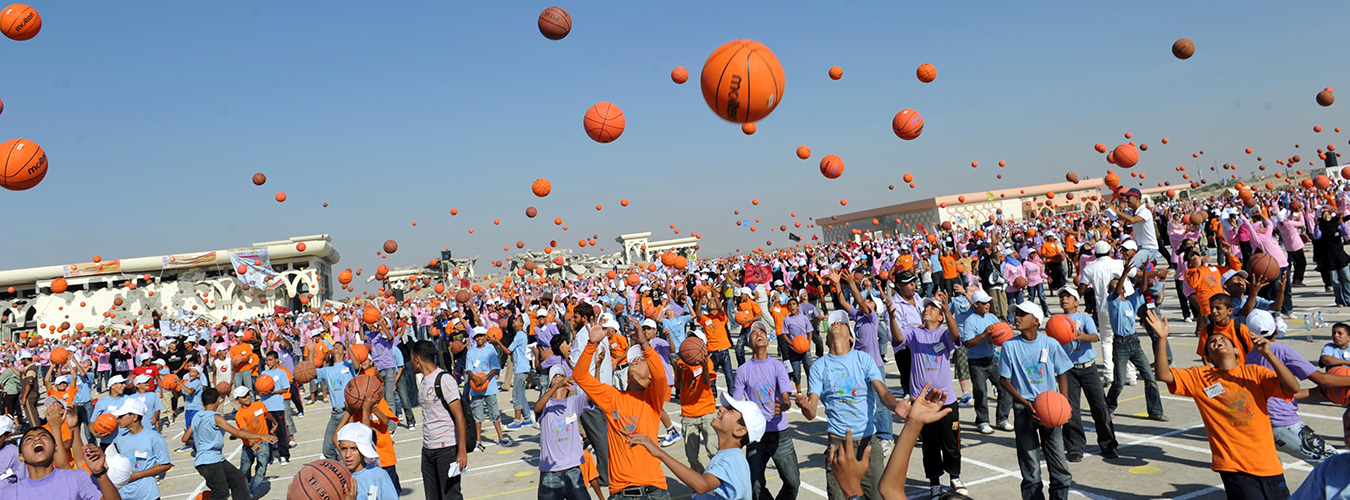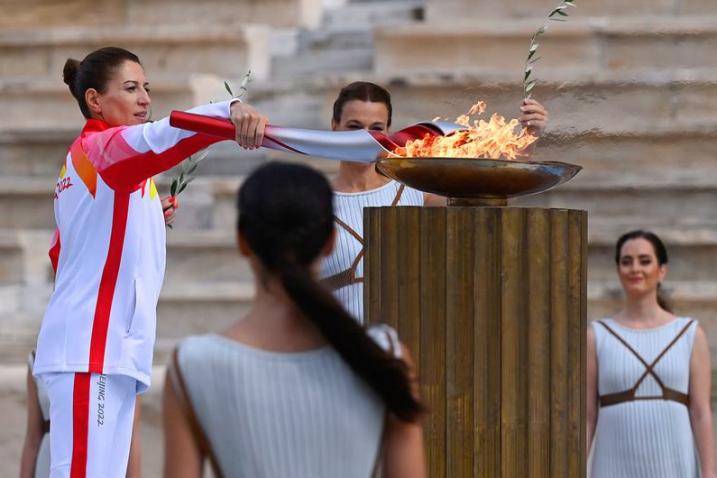World Basketball Day | United Nations (original) (raw)

In an event dubbed the Great Global Gaza Bounce, 7,200 campers of the United Nations Relief and Works Agency for Palestine Refugees in the Near East (UNRWA) Summer Games gather in Gaza City in a bid to set the Guinness World Record for the largest simulta
Photo:UN Photo/Shareef Sarhan
Basketball: Crafting an Enduring Legacy for
A Better Future
December 21, 2023 - In celebration of the inaugural World Basketball Day, the Permanent Mission of the Philippines to the United Nations, in collaboration with the Naismith Basketball Hall of Fame, will organize a forum on Basketball and Peace: A conversation with Julius "Dr. J" Erving. Follow the event on UN Webtv.
In the 2030 Agenda for Sustainable Development, sport is recognized as an important enabler of sustainable development. Sports, the arts and physical activity have the power to change perceptions, prejudices and behaviours, as well as to inspire people, break down racial and political barriers, combat discrimination and defuse conflict.
Basketball impacts global spheres of commerce, peace and diplomacy, and creates a unique space of cooperation, physical movement and an interdependence that allows participants to see each other as human beings first and foremost.
Like many other sports, basketball transcends borders, cultures, and languages. It serves as a unifying force where people from different backgrounds can come together, bond and communicate with each other, creating connections and breaking down barriers, and thereby contributing to peace.
Harlem Globetrotters score for peace
The world-famous Harlem Globetrotters brought their basketball skills to the United Nations, where they scored big for its goals of peace, gender equality and the empowerment of youth. Combining an inspirational message with dexterous skills, these players showed the power of teamwork for peace and understanding.
Background
Basketball was played for the first time on December 21, 1891 at the International YMCA Training School in Springfield, Massachusetts, USA, after Dr. James Naismith, a Canadian physical education instructor, developed the game to keep his students active during the winter months.
Today, basketball has grown to become one of the most popular and widely played sports in the world. FIBA, basketball’s governing body, estimates that at least 450 million people worldwide are playing basketball today. Basketball has also been a part of the Olympic program since its introduction at the 1936 Berlin Olympics.
Basketball enjoys a strong presence in North America, especially the United States, Europe, Asia, and other regions. In 2019, the ground-breaking Basketball Africa League (BAL), was established and is a now a professional league featuring 12 club teams from across Africa. Women started playing basketball as early as 1892, or less than a year after the game was invented. Women’s basketball made its debut as a regular team sport for women in the Olympics at the 1976 Montreal Games.
Overall, beyond iconic names, such as Jordan, Magic, Kareem, Bird, Kobe, Lebron, Curry, basketball is a global grassroots sport and is played and enjoyed by people of all ages and skill levels, from organized leagues to casual pickup games.
Recognizing sport, including sport for persons with disabilities, has an important role to play in the promotion of peace and development, respect for human rights, gender equality and the empowerment of women and girls, in particular basketball, given its universal popularity. On 25 August 2023, the General Assembly adopted resolution A/RES/77/324 proclaiming 21 December as World Basketball Day.
In the resolution, the General Assembly commends Indonesia, Japan, and the Philippines for hosting the International Basketball Federation Basketball World Cup 2023 and encourages the relevant authorities to exert every effort to ensure that the Basketball World Cup 2023 will leave a lasting legacy for peace and development around the world. It also encourages everyone everywhere to play, watch, read, discuss or otherwise connect to basketball game, which will be a connection to each other everywhere.
The resolution also invites all Member States, organizations of the United Nations system, in particular the Division for Inclusive Social Development of the Department of Economic and Social Affairs (DESA)of the Secretariat, other international and regional organizations, the private sector and civil society, including non-governmental organizations, individuals and other relevant stakeholders to observe World Basketball Day in an appropriate manner and in accordance with national priorities, and to disseminate the advantages of basketball for all, including through educational and public awareness-raising activities.
Inspirational Quotes from Basketball Figures
- "I can accept failure, everyone fails at something. But I can't accept not trying." - Michael Jordan
- "The only way to do something is to do it." - Kobe Bryant
- "It is really awesome to see everyone empower each other. If they are able to watch us and see what we do, we hope to empower a younger generation of girls and form a better future for them." - Sabrina Ionescu
- "Sport is the best means of communication between people from different religions and countries." - Yao Ming
- "Basketball is a beautiful game when the five players on the court play with one heartbeat." - Dean Smith
- "If you do the best you can, you have nothing to be ashamed of. A defeat is not a disgrace." - Dirk Nowitzki
Key Documents
- General Assembly Resolution on establishing the World Day
(A/RES/77/324) - General Assembly Resolution on Sport as an enabler of sustainable development (A/RES/77/27)
- General Assembly Resolution on Building a peaceful and better world through sport and the Olympic ideal (A/RES/76/13)
- General Assembly Resolution on Sport as an enabler of sustainable development (A/RES/75/18 )
- General Assembly Resolution on Sport as a means to promote education, health, development and peace (A/RES/58/5)
- Report of the Secretary-General on “Sport: Catalyst for a Better, Stronger Recovery” (2022)
- Report of the Secretary-General on “Sport: a global accelerator of peace and sustainable development for all” (2020)
- Report of the Secretary-General on “Strengthening the global framework for leveraging sport for development and peace” (2018)
Related Website
- Sustainable Development Goal 3: Ensure healthy lives and promote well-being for all at all ages
- Inter-Agency Group on Sport for Development and Peace (IAGSDP)
- WHO
- UNESCO
- UNHCR
- UNODC
- UNOCT
Related Observances
- International Day of Sport for Development and Peace (6 April)
- World Bicycle Day (3 June)
- International Day of Yoga (21 June)
- World Chess Day (20 July)
- International Youth Day (12 August)
- International Human Solidarity Day (20 December)
- International Year for Sport and Physical Education (2005)
The UN and the Olympic Truce
The ancient Greek tradition of the ekecheiria, or "Olympic Truce", was born in the eighth century B.C., serving as a hallowed principle of the Olympic Games. In 1992, the International Olympic Committee renewed this tradition by calling upon all nations to observe the Truce. The Olympic movement aspires to contribute to a peaceful future for humankind through the educational value of sport. It brings together athletes from all parts of the world in the greatest of international sports events, the Olympic Games, and it aims to promote the maintenance of peace, mutual understanding and goodwill — goals it shares with the United Nations. Read More
Why do we mark International Days?
International days and weeks are occasions to educate the public on issues of concern, to mobilize political will and resources to address global problems, and to celebrate and reinforce achievements of humanity. The existence of international days predates the establishment of the United Nations, but the UN has embraced them as a powerful advocacy tool. We also mark other UN observances.

